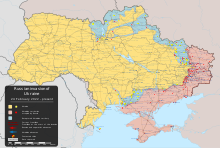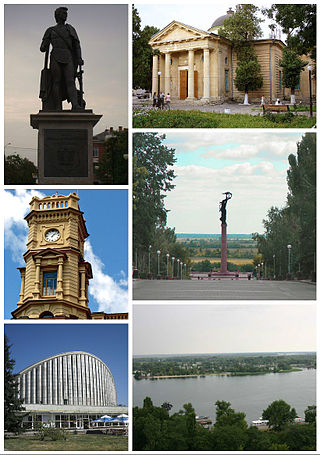
Kherson is a port city in Ukraine that serves as the administrative centre of Kherson Oblast. Located by the Black Sea and on the Dnieper River, Kherson is the home to a major ship-building industry and is a regional economic centre. At the beginning of 2022, its population was estimated at 279,131.

Yevgeny Vitalyevich Balitsky is a Russian and former Ukrainian politician, entrepreneur and former army officer who is currently serving as the governor of Zaporozhye Oblast, one of the Russian-occupied territories of Ukraine, since 2022.
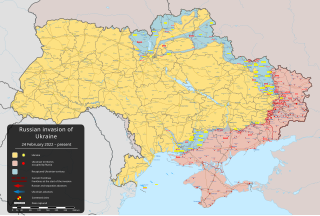
The southern Ukraine campaign is an ongoing theatre of operation in the Russian invasion of Ukraine, which began on 24 February 2022. The Russian military invaded Kherson Oblast in southern Ukraine from Russian-occupied Crimea, quickly entering Mykolaiv Oblast and Zaporizhzhia Oblast amid battles with the Armed Forces of Ukraine.
A military engagement took place between the Armed Forces of Ukraine and the Armed Forces of Russia in the city of Melitopol, Zaporizhzhia Oblast, on the southern front of the Russian invasion of Ukraine. Russian forces entered the city on 25 February and took control of its government buildings.
Galina Viktorovna Danilchenko is a Russian and Ukrainian accountant and politician who was installed by Russia as the acting mayor of Melitopol during the 2022 Russian invasion of Ukraine, following the kidnapping of Ivan Fedorov by the Russian military. She was a former member of the Melitopol City Council, elected in 2015, and became its secretary soon thereafter.
During the Russian invasion of Ukraine and the resulting Russian occupation of multiple Ukrainian towns and cities, numerous cases of non-violent resistance against the invasion took place. Local residents organised protests against the invasion and blocked the movement of Russian military equipment. The Russian military dispersed the protests, sometimes with live fire, injuring many and killing some. Most of the large protests ended in March.
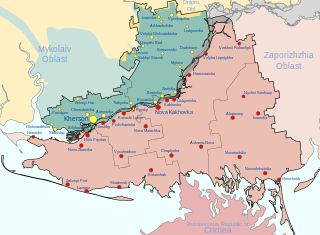
The Russian occupation of Kherson Oblast is an ongoing military occupation of Ukraine's Kherson Oblast by Russian forces that began on 2 March 2022 during the Russian invasion of Ukraine as part of the southern Ukraine campaign. It was administrated under a Russian-controlled military-civilian administration until 30 September 2022, when it was illegally annexed to become an unrecognized federal subject of Russia.
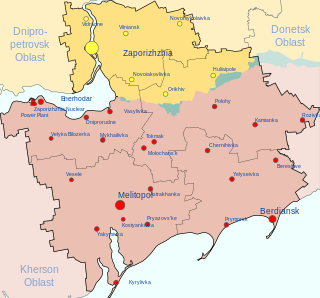
The Russian occupation of Zaporizhzhia Oblast is an ongoing military occupation of Ukraine's Zaporizhzhia Oblast by Russian forces that began on 24 February 2022 during the Russian invasion of Ukraine as part of the southern Ukraine campaign. It was administrated under a Russian-controlled military-civilian administration until 30 September 2022, when it was illegally annexed to become an unrecognized federal subject of Russia.
During the Russian invasion of Ukraine there has been military and political collaborationism between Ukrainian citizens and officials and the Russian military.

Hennadiy Mykolayovych Lahuta was a Ukrainian politician who served as the governor of Kherson Oblast from 26 October 2021 to 9 July 2022. Lahuta was removed from office by the Russian military on 26 April 2022 during the Russian occupation of Kherson Oblast. He was removed from office by President Volodymyr Zelenskyy on 9 July, replacing him with Dmytro Butriy. He was a member of the We Have to Live Here party headed by the mayor of Kherson Ihor Kolykhaiev.

Kirill Sergeyevich Stremousov was a Ukrainian-born blogger and politician who served as the deputy head of the Kherson military–civilian administration in Russian-occupied Ukraine from 26 April 2022 until his death on 9 November 2022, just before Russia ordered a retreat from Kherson.
The Salvation Committee for Peace and Order is the collaborationist supreme administrative and executive authority in the territory of the Kherson Oblast, formed by the constituent Assembly on 10 March 2022 following the capture of most of the oblast's territory by Russian troops in the Russian invasion of Ukraine.
Viktor Leonidovich Bedrik is a Russian military officer, currently serving as military head of the Kherson military-civilian administration. He holds the rank of colonel.
During the Russian invasion of Ukraine, Russia occupied vast portions of the territory of Ukraine, having already occupied parts of the Donetsk and Luhansk oblasts as well as the entire Autonomous Republic of Crimea since the beginning of the Russia-Ukraine war in 2014. Partisan groups began to be organized in mid-2022. These groups have been involved in intelligence-gathering, sabotage, and assassinations. Much of their activity has taken place in the Kherson and Zaporizhzhia regions.

The Russian occupation of Mykolaiv Oblast is an ongoing military occupation of Ukraine's Mykolaiv Oblast by Russian forces during the Russian invasion of Ukraine as part of the southern Ukraine campaign. The Russian-installed occupation regime was called the "Nikolaev military-civilian administration".

A military counteroffensive was launched by Ukraine on 29 August 2022 to expel Russian forces occupying the southern regions of Kherson and Mykolaiv oblasts.
In late September 2022, in the context of the Russian invasion of Ukraine, Russian-installed officials in Ukraine staged so-called referendums on the annexation of occupied territories of Ukraine by Russia. They were widely described as sham referendums by commentators and denounced by various countries. The validity of the results of the referendums has been accepted by North Korea, and no other sovereign state.

We Are Together with Russia is a pro-Russian collaborationist organization operating in the Russian-occupied Zaporizhzhia Oblast and supported by the Russian authorities. It describes itself as an "integration movement". The movement actively advocates the accession of the region to the Russian Federation, and according to the Ukrainian media it is actively involved in the preparation of "referendums" on the occupied Ukrainian territories becoming part of Russia. Its activities are being organized by the United Russia party and the All-Russia People's Front, headed by Vladimir Putin.

Since the beginning of the Russian invasion of Ukraine in February 2022, the media have been publishing eyewitness accounts of military operations in Ukraine about cases of looting by soldiers of the Russian army. International organizations such as Human Rights Watch, as well as Ukrainian, European and Russian independent media and NGOs document and investigate cases of looting and transportation of stolen personal items and industrial equipment to the territory of Russia and Belarus.
Tavria TV is a Russian television and radio company in Kherson Oblast that is one of the three largest Russian media outlets broadcasting in the Russian-occupied territories of Ukraine.
